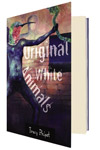If you want your raw, fierce, erotic, and deeply affecting poetry to be almost entirely ignored by everyone who might like it, here’s what to do. First, win a national contest with a collection of confusing apprentice work. Then, move to mega-remote Seldovia, Alaska—in fact, move to a cabin outside Seldovia. Do not write easily understood “nature poetry,” and do not publish prose about your cold, unspoiled world. Instead, work as a domestic violence counselor, and as an advocate for abused women, many of them native Alaskan, in villages so remote only airplanes will go there. Assimilate unfashionable influences (Ted Hughes, Adrienne Rich, Native poems in translation) along with one just now becoming hip (C. D. Wright). Give your first good book (your second overall) to an earnest small press with limited distribution. Then give the next, more accessible book to the same press, which happens to be moving to a new state the year the book comes out. Place on windowsill. Let cool.
No wonder most people who read lots of new verse each year have never heard of Tracy Philpot. Most people don’t know what they’ve missed. “I’m all the homesick birds / Who have ever told the truth / By migrating,” Philpot announces. If you want rural detail, Philpot has it: “The hairless cat is tanning / near the fire ring where in the evenings / we roast unlucky chocolate bars.” Most of her poems, though, do more than present remote scenes. They ask you to put together dissimilar pieces, fitting claustrophobic household gossip alongside primal offerings to auroras and forest ghosts.
Philpot’s title quotes her poem “The Mary,” which prays that “our original white animals / our True People take us back.” Reverent in her curt notice of mammal and bird, polar predator and snowy prey, Philpot insists that we, too, are animals, and that we should both cherish and check our instincts. That insistence makes her sound a bit like a shaman, someone who speaks to nature as we cannot: “animals haunt me from their graves and the clock / knows enough to leave me alone.” Philpot’s poems encompass a wilderness-friendly bliss, but they also record exasperation—with village life, with the weather, with motherhood. In “The Idiocy of Rural Life” (the title an unattributed quote from Karl Marx), “the baby grows dark / like a plane that’s not supposed to rely on instruments / trying to outrun a squall”; the baby’s “small calls for company” mean she is “grooming herself so she can be a beautiful sleeper // but there’s only sleeplessness and asthmatic planes.”
Philpot’s poetry is as individual, as unpredictable, and sometimes as messy as lightning or a birth. The most unguarded of writers, she risks big abstract claims nobody else would make; often those risks bring great rewards. One elegy begins, “It would be better if some different people died.” Another says all that needs saying against the idea of a personal God: “The world is too harmonious / to have been knitted by one person too awful / to blame on one.” The poems settle, fitfully, in between joy and mourning. They cry over miscarried children, the war dead, the lost potential selves we all possess, and the individual women whom Philpot has tried, or failed, to help. “We are not powerful / We are not saved / So kiss her for me, someone / And wish her ghosts gone.”





